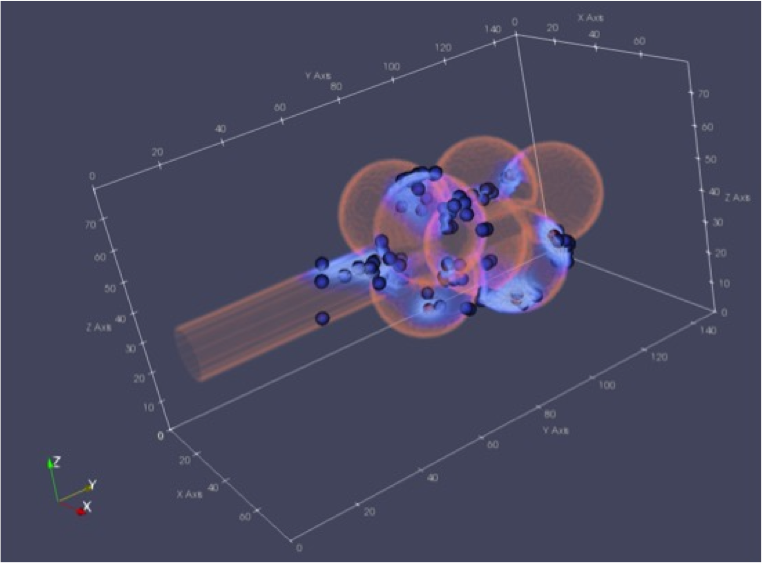
Dr. Reinhard Laubenbacher, Dean’s Professor of Systems Medicine and director of the Laboratory for Systems Medicine in the College of Medicine at the University of Florida, will visit the Texas A&M University campus next week to deliver the 2022 Sue Geller Undergraduate Lecture, the fifth in an annual series intended to educate and inspire students in the Texas A&M Department of Mathematics.
Laubenbacher, a recognized expert in health research and multiscale computational models of disease processes, systems biology and biomedical data science, will present “Medical Digital Twins: Mathematics for 21st Century Medicine” on Tuesday, April 12, at 6 p.m. in Room 117 of the John R. Blocker Building. The event will be preceded by a reception at 5:30 p.m. and followed by a brief discussion opportunity from 7 to 7:30 p.m.
In industry, a digital twin is a computational model customized to a particular piece of machinery, such as a wind turbine, or an organizational structure, such as an entire factory. Continually fed with streaming operational data, it is used for all manner of forecasting, optimization and control. Even though humans are infinitely more complex than industrial machinery, Laubenbacher says one can make a clear analogy in medicine. His lecture will present examples of what might be considered medical digital twins and explore the many challenges and opportunities that this paradigm of personalized computational models presents, ranging from the mathematical and computational to the biological, medical, ethical and political.
Laubenbacher joined the UF faculty in May 2020 as a professor in the Department of Medicine’s Division of Pulmonary, Critical Care and Sleep Medicine. Previously, he had served since 2013 as a professor in the Department of Cell Biology and director of the Center for Quantitative Medicine within the University of Connecticut School of Medicine. Concurrently, he held an appointment as a professor of computational biology at the Jackson Laboratory for Genomic Medicine. Prior to these appointments, he served as a professor at the Virginia Bioinformatics Institute and the Department of Mathematics at Virginia Tech since 2001. He was an adjunct professor in the Department of Cancer Biology at Wake Forest University in Winston-Salem (NC) and affiliate faculty in the Virginia Tech Wake Forest University School of Biomedical Engineering and Sciences. He has served as visiting faculty at Los Alamos National Laboratories, the Mathematical Science Research Institute at Berkeley and Cornell University.
Laubenbacher is a fellow of the American Association for the Advancement of Science, the Society for Mathematical Biology and the American Mathematical Society. From 2016 to 2022, he served as editor-in-chief of the Bulletin of Mathematical Biology, the flagship journal of the Society for Mathematical Biology. A mathematician by training, Laubenbacher’s broad research interests lie in computational and mathematical systems medicine. Most of his research is done in collaboration with a broad spectrum of scientists and clinicians.
The Geller Undergraduate Lecture Series was founded in 2016 as the Mathematics Undergraduate Research Lecture to provide a venue for undergraduate students to interact with leading researchers from outside Texas A&M who have also demonstrated a deep interest in and capacity for student mentoring. It was renamed in 2018 to honor Dr. Sue Geller, a longtime Texas A&M mathematician as well as the founder and longtime director of Texas A&M Mathematics Honors, the first department-level honors program at Texas A&M. Known to students as Dr. Sue, Geller has supervised more than 100 masters students and has mentored an uncountable (although finite) number of undergraduates. Her honors include the Ron Barnes Distinguished Service to Students Award from the Texas section of the Mathematical Association of America and the Texas A&M Association of Former Students Distinguished Achievement Award for Student Relations.
Learn more about the lecture or undergraduate research in Texas A&M Mathematics,
# # # # # # # # # #
About Research at Texas A&M University: As one of the world’s leading research institutions, Texas A&M is at the forefront in making significant contributions to scholarship and discovery, including in science and technology. Research conducted at Texas A&M generated annual expenditures of more than $1.13 billion in fiscal year 2020 and ranked 14th in the National Science Foundation’s Higher Education Research and Development Survey. Texas A&M’s research creates new knowledge that provides basic, fundamental and applied contributions resulting, in many cases, in economic benefits to the state, nation and world. To learn more, visit Research@Texas A&M.
